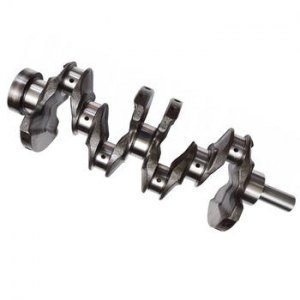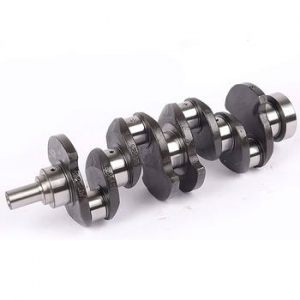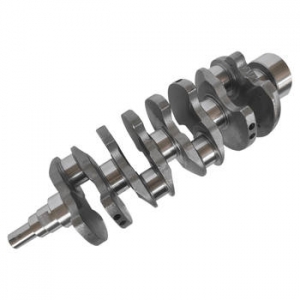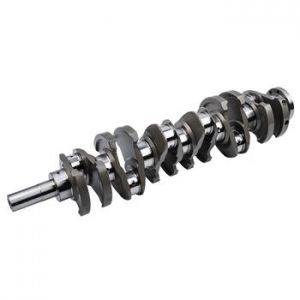The Ultimate Guide to Getting an Accurate Crankshaft Price Quote
Your vehicle's engine is a marvel of engineering, a symphony of moving parts working in harmony to propel you down the road. At the very heart of this intricate system lies the crankshaft, a crucial component that converts the up-and-down motion of the pistons into rotational energy, ultimately driving your wheels. Without a functioning crankshaft, your engine is, quite simply, dead in the water. So, when issues arise with this vital part, one of the first questions that springs to mind is, "What will a crankshaft price quote look like?"
To be honest, getting a precise figure isn't always straightforward. Many variables come into play, influencing everything from the cost of the part itself to the labor involved in its installation. This comprehensive guide aims to demystify the process, helping you understand the factors that dictate a crankshaft's price and how to navigate the market to get the best value. Have you ever wondered what truly makes your engine tick, and what it costs to keep that tick going strong?
Understanding the Heart of Your Engine: Why a Crankshaft Matters
Before we dive into the nitty-gritty of pricing, let's briefly recap why the crankshaft is such a big deal. Imagine your engine as a human body; if the pistons are the muscles, the crankshaft is the spine, connecting everything and facilitating movement. It's subjected to immense forces, heat, and friction, making it a highly engineered and robust component. However, like any part under constant stress, it can eventually wear out, become damaged, or even break. When this happens, you're faced with a significant repair, and understanding the potential crankshaft price quote becomes paramount.
Common issues include worn journals (where the connecting rods attach), cracks, bending, or even complete breakage due to severe engine problems like hydro-lock or catastrophic bearing failure. Identifying the specific problem is the first step towards getting an accurate quote, as it dictates whether a repair is feasible or if a full replacement is necessary. Interestingly enough, sometimes a minor issue can be fixed, but often, a crankshaft failure indicates a broader problem within the engine that also needs addressing.
Key Factors Influencing Your Crankshaft Price Quote
When you seek a crankshaft price quote, you'll quickly realize that prices can vary wildly. This isn't just random; it's due to several critical factors that impact both the cost of the part and the labor required for its installation. Understanding these elements will empower you to ask the right questions and interpret the quotes you receive.
New vs. Used vs. Remanufactured Crankshafts
This is arguably the most significant factor affecting your initial crankshaft price quote. You generally have three options:
- New Crankshafts: These are brand new, often OEM (Original Equipment Manufacturer) parts, or high-quality aftermarket equivalents. They come with a warranty and are guaranteed to be within factory specifications. As you might expect, they represent the highest investment. For a common vehicle, a new crankshaft alone could range from a few hundred to over a thousand dollars, while specialized or heavy-duty applications can easily exceed that.
- Remanufactured Crankshafts: This is often a sweet spot for many vehicle owners. A remanufactured crankshaft has been taken from a core, thoroughly inspected, cleaned, machined to precise specifications (often undersized for new bearings), polished, and balanced. They essentially meet or exceed new part standards but at a lower cost. The remanufactured crankshaft cost typically falls between new and used options, offering a good balance of reliability and affordability. Many experts agree that for most repairs, a high-quality remanufactured unit is an excellent choice.
- Used Crankshafts: Sourced from salvage yards or donor engines, used crankshafts are the cheapest option upfront. However, they come with the highest risk. Unless thoroughly inspected and measured by a professional machinist, you might be buying a part with hidden wear, cracks, or damage that could lead to premature failure. While the initial crankshaft price quote for a used part might be appealing, the potential for future problems often outweighs the savings. In my experience, this option should only be considered if the budget is extremely tight and a professional can verify its integrity.
Material and Manufacturing Quality
The material and manufacturing process also play a role. Most production crankshafts are made from cast iron or forged steel. Forged steel crankshafts are stronger and more durable, often found in high-performance or heavy-duty engines, and consequently, they cost more. The precision of machining, balancing, and surface finishing also contributes to the overall quality and price. A crankshaft for a high-revving sports car will inherently be more expensive than one for a standard commuter sedan due to these factors.
Engine Type and Vehicle Application
The complexity and size of your engine directly impact the crankshaft's design and, therefore, its price. A small 4-cylinder engine will have a less complex and less expensive crankshaft than a large V8 or a diesel engine from a heavy-duty truck. Performance engines, which require lighter, stronger, and more precisely balanced crankshafts, will also command a higher price. This factor heavily influences the overall cost of crankshaft replacement.
Brand and Supplier
Just like any automotive part, the brand matters. OEM parts from the vehicle manufacturer are typically the most expensive but guarantee perfect fitment and quality. Reputable aftermarket brands offer good quality at a more competitive price. Less known or generic brands might be cheaper, but their quality can be inconsistent. Where you purchase the crankshaft also affects the price – dealerships, independent parts stores, and online retailers all have different pricing structures.
Labor Costs: The Hidden Variable
Frankly speaking, the part itself is often only half the battle, if not less. The labor involved in replacing a crankshaft is substantial. It requires extensive engine disassembly, often involving removing the engine from the vehicle entirely. This is a highly skilled and time-consuming job. Labor rates vary significantly by region, shop reputation, and the complexity of your vehicle's engine. A typical crankshaft replacement can involve 15-30+ hours of labor. At an average shop rate of $100-$150 per hour, you can see how quickly labor costs add up, significantly influencing your final crankshaft price quote.

Navigating the Market: Where to Get Your Crankshaft Price Quote
Once you understand the factors influencing the price, the next step is knowing where to go to get reliable quotes. Different sources offer different advantages and disadvantages.
Dealerships vs. Independent Mechanics
- Dealerships: They offer OEM parts and factory-trained technicians. The advantage is guaranteed quality and expertise specific to your vehicle's make and model. The disadvantage is that they are almost always the most expensive option for both parts and labor. Their crankshaft price quote will likely be at the higher end of the spectrum.
- Independent Mechanics: These shops can offer a more competitive crankshaft price quote. Many independent shops have excellent reputations and skilled mechanics. They often have access to both OEM and quality aftermarket parts, giving you more options. It's crucial to choose a reputable shop with experience in major engine repairs. Look for certifications (like ASE) and positive customer reviews.
Online Retailers and Parts Stores
Websites like RockAuto, Summit Racing, or even Amazon can offer highly competitive prices on crankshafts, especially for aftermarket or remanufactured units. Local auto parts stores (AutoZone, O'Reilly, Advance Auto Parts, NAPA) also carry a range of options. The benefit here is often a lower part cost. However, you'll still need to factor in shipping, and you'll need a mechanic to install it. It's worth noting that without precise details (like your VIN and engine code), any quote from these sources is just an estimate. Always double-check compatibility before purchasing a part yourself.
Specialty Engine Shops
For high-performance vehicles, classic cars, or highly customized engines, a specialty engine shop or a machine shop might be your best bet. These shops often have the expertise and equipment to not only replace but also repair or custom-build crankshafts. While their services might come at a premium, their specialized knowledge can be invaluable for complex situations or when you're looking for performance upgrades.
What Information Do You Need to Provide?
To get an accurate crankshaft price quote, you must provide specific information about your vehicle and the problem. Be prepared with:
- Vehicle Identification Number (VIN): This is crucial as it precisely identifies your vehicle's make, model, year, and engine configuration.
- Make, Model, Year: Standard identification.
- Engine Size and Type: (e.g., 2.0L 4-cylinder, 5.7L V8, Diesel, Turbocharged).
- Specific Symptoms and Diagnosis: What led you to believe the crankshaft is the issue? Has a mechanic already diagnosed it? Providing a detailed diagnosis helps the quoting party understand the scope of work.
It's worth noting that without precise details, any quote is just an estimate. A reputable shop will often want to perform their own diagnostic before giving a firm price.
Repair or Replace? Understanding the Total Engine Crankshaft Repair Cost
One of the most critical decisions you'll face is whether to repair your existing crankshaft or replace it entirely. This decision significantly impacts the total engine crankshaft repair cost.
Assessing the Damage
A thorough inspection by a qualified machinist or engine builder is essential. Minor issues, like slight wear on the journals, might be repairable through a process called "grinding" or "regrinding." This involves machining the journals down to a smaller diameter and then using undersized bearings. If the crankshaft is bent, cracked, or has suffered catastrophic damage (e.g., a broken journal or counterweight), replacement is almost always the only viable option. Many experts agree that a thorough inspection is paramount before making any decision.
The Economics of Repair
If repair is an option, the engine crankshaft repair cost will typically include the machining process, new undersized bearings, and the labor to remove and reinstall the crankshaft. While often cheaper than a new crankshaft, it's not always a guaranteed fix, especially if the damage is extensive or if the crankshaft has been reground multiple times before. The cost of grinding can vary, but it's generally a few hundred dollars, plus the cost of new bearings and labor.
The Long-Term View
When considering repair versus replacement, think about the overall condition and age of your vehicle. If it's an older car with high mileage and other components are showing signs of wear, investing in a major crankshaft repair or replacement might not be economically sound. The cost of crankshaft replacement, when combined with other potential upcoming repairs, might exceed the vehicle's market value. Conversely, if your car is relatively new and in good condition, a crankshaft replacement can extend its life significantly. I've found that a holistic view of the vehicle's health is crucial for making the right financial decision.

DIY vs. Professional Installation: Weighing the Costs and Risks
For the mechanically inclined, the idea of tackling a crankshaft replacement as a DIY project might seem appealing, primarily to save on labor costs. However, this is one of the most complex and demanding automotive repairs, and it's essential to understand the true implications.
The Allure of DIY: Saving on Labor
If you're considering a DIY approach, you'll save significantly on the labor portion of the crankshaft price quote. However, you'll need a comprehensive set of tools, including specialized engine tools, a torque wrench, engine hoists, and potentially a clean workspace. More importantly, you'll need a deep understanding of engine mechanics, precise torque specifications, and meticulous attention to detail. This isn't a job for the faint of heart or inexperienced. A single mistake during reassembly can lead to catastrophic engine failure, costing you far more in the long run than professional labor would have.
The Value of Professional Expertise
Opting for professional installation, while increasing your initial crankshaft price quote, offers several undeniable advantages:
- Expertise: Professional mechanics have the training, experience, and specialized tools to perform the job correctly and efficiently.
- Warranty: Most reputable shops offer a warranty on both parts and labor, providing peace of mind. If something goes wrong shortly after the repair, you're covered.
- Efficiency: A professional can complete the job much faster than an amateur, getting your vehicle back on the road sooner.
- Peace of Mind: Knowing the job was done right by a qualified individual is invaluable. The true cost of crankshaft replacement includes professional installation for most vehicle owners, as it mitigates significant risks.
Potential Pitfalls of DIY
To be honest, the risks associated with a DIY crankshaft replacement are substantial. Incorrect torque settings on main or rod bearings can lead to immediate engine failure. Improper sealing can cause oil leaks. Contamination during assembly can damage new bearings. Furthermore, disposing of old engine fluids and parts can be a hassle. Frankly speaking, unless you are a seasoned engine builder with all the right equipment, this is a job best left to the professionals.

Final Thoughts on Securing Your Crankshaft Price Quote
Ultimately, getting an accurate crankshaft price quote is a multi-faceted process that requires diligence and understanding. It's not just about the part; it's about the type of part, the labor involved, the shop's expertise, and your vehicle's overall condition. Don't settle for the first quote you receive. Shop around, ask detailed questions, and ensure you understand what's included in the price.
Remember to consider the long-term value. Sometimes, paying a bit more for a high-quality remanufactured or new part and professional installation will save you money and headaches down the road. A crankshaft replacement is a significant investment in your vehicle, and an informed decision will ensure you get the best possible outcome for your money and your peace of mind.
For more detailed information, please visit our official website:crankshaft price quote
About the author: Alex "The Wrench" Rodriguez is a seasoned automotive expert with over two decades of experience specializing in engine diagnostics and repair. Known for his practical insights and ability to demystify complex mechanical issues, Alex has helped countless vehicle owners understand their options and make informed decisions. His passion for automotive engineering and commitment to quality shine through in his comprehensive guides and advice.
 The Ultimate Guide to Getting
The Ultimate Guide to Getting
 The Unsung Heroes: Unveiling t
The Unsung Heroes: Unveiling t
 Unlocking Power: A Deep Dive i
Unlocking Power: A Deep Dive i
 The Ultimate Industrial Cranks
The Ultimate Industrial Cranks
